Greatest female football players of all time as Marta, Mia Hamm, Christine Sinclair, Alexia Putellas, Abby Wambach, Renate Lingor, Lily Parr, Nadine Angerer, Carli Lloyd, Birgit Prinz. All will be in this article.
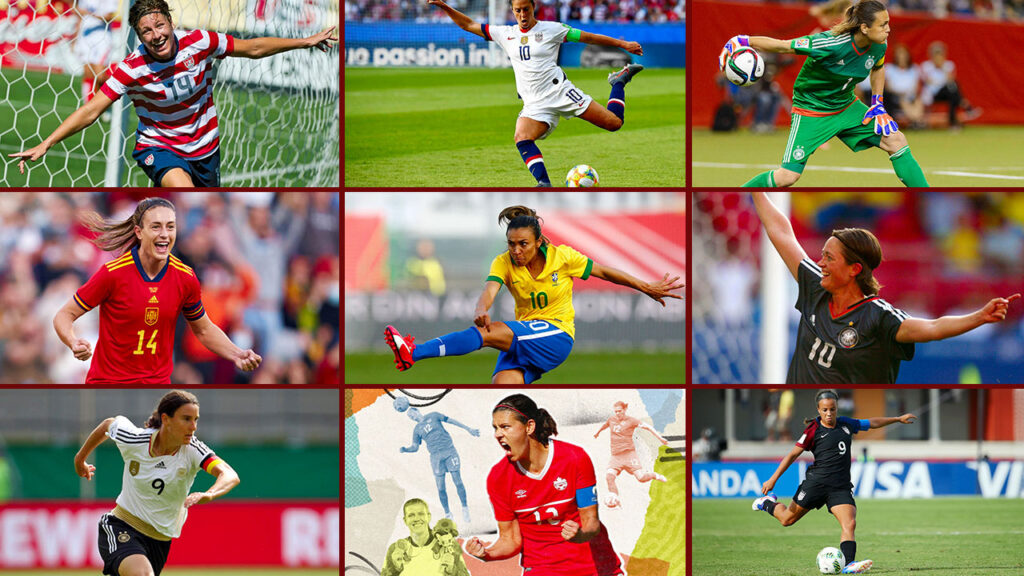
Enter the world of women’s football and witness the extraordinary achievements of the top female athletes who have revolutionized the game. As we anticipate the upcoming World Cup, let us honor the legends who have propelled the sport to new heights. From captivating dribbles to awe-inspiring goals, these players have mesmerized audiences worldwide. Brace yourself as we explore the elite list of the ten greatest female football players of all time.
Top 10 greatest female football players of all time
1. Marta (Forward, Brazil)
Known as the “Pele in skirts,” Marta Vieira da Silva has redefined what it means to be a skilled player. With her mesmerizing ability to outmaneuver defenders and create and score goals, Marta has solidified her status as the most talented individual in the sport today. With five consecutive FIFA female World Player of the Year awards and a multitude of records, the only achievement missing from Marta’s illustrious career is a major championship.
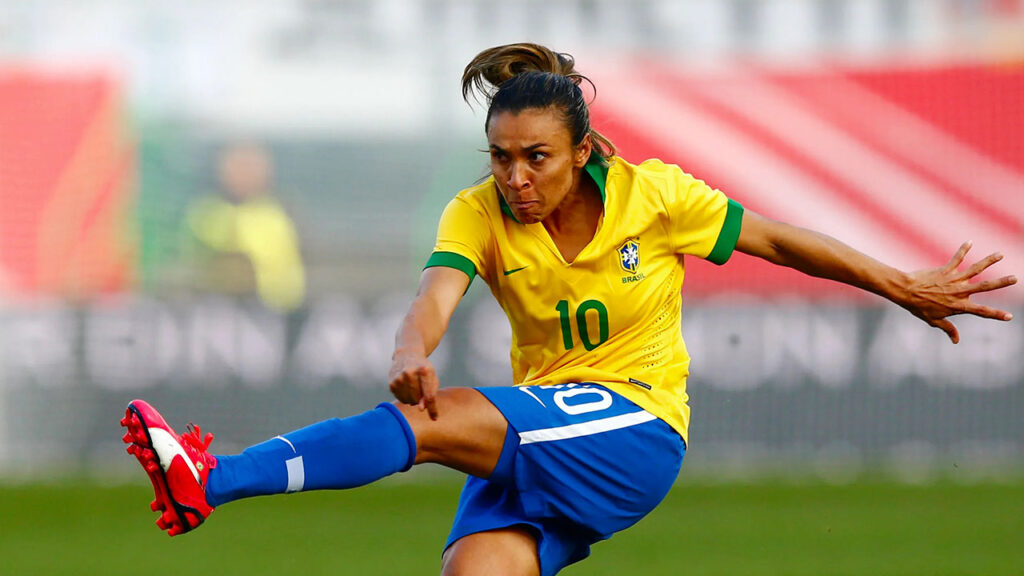
Marta’s career has been filled with exceptional performances, showcasing her undeniable talent and passion for the game. Her dribbling skills are unmatched, as she effortlessly weaves through defenders and leaves them in her wake. Marta’s ability to create scoring opportunities for herself and her teammates is a testament to her exceptional vision and soccer intelligence.
Not only is Marta a prolific goal-scorer, but she also possesses incredible playmaking abilities. Her precise passes and innate understanding of the game make her a force to be reckoned with on the field. Marta’s influence extends beyond her individual achievements, as she has played a significant role in elevating the level of women’s football in Brazil and inspiring young athletes around the world.
2. Mia Hamm (Forward, USA)
A true icon of women’s football, Mia Hamm holds a special place in the hearts of fans worldwide. With her unmatched goal-scoring prowess and remarkable accomplishments, Hamm has inspired generations of aspiring players. As a record-breaker and a leader, her impact on the game is immeasurable.
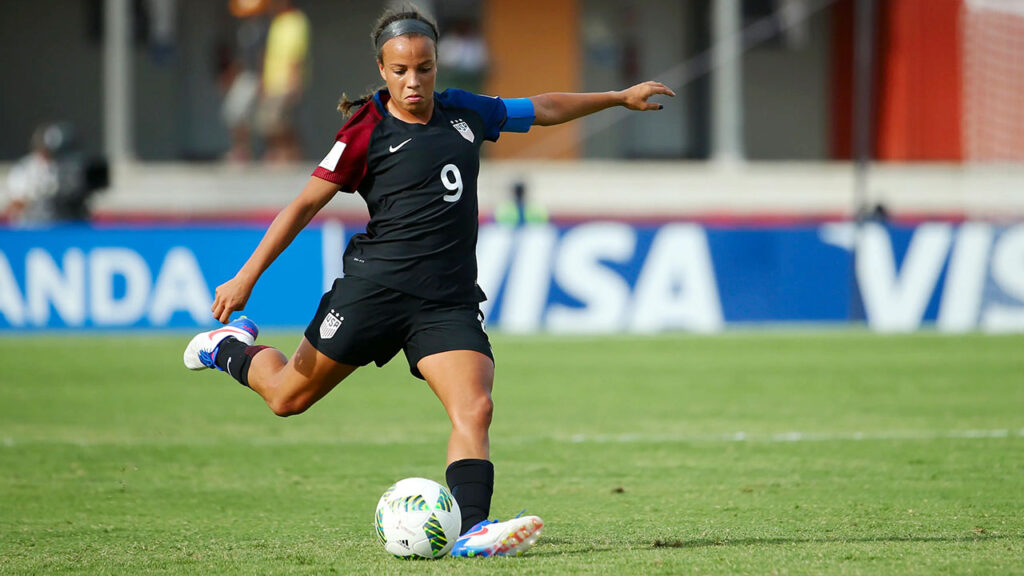
Hamm’s career is the epitome of excellence. She holds numerous records, including the most international goals scored by any player, male or female, at the time of her retirement. Her speed, agility, and clinical finishing ability made her a nightmare for defenders. Hamm’s ability to find the back of the net in crucial moments earned her the reputation of a true clutch player.
Beyond her individual achievements, Hamm played a crucial role in the success of the United States Women’s National Team. Her leadership and determination propelled the team to victory in several major tournaments, including the historic 1999 Women’s World Cup. Hamm’s influence on women’s football extends far beyond her playing career, as she continues to advocate for gender equality in sports.
3. Christine Sinclair (Forward, Canada)
Christine Sinclair’s name is synonymous with Canadian football greatness. She holds the record for the most goals scored in international matches, and her impressive career spans six World Cups. With a gold medal and numerous personal and team accolades, Sinclair’s influence on the sport is undeniable.

Sinclair’s dedication and commitment to the game are evident in her performances on the field. Her clinical finishing and ability to score from any position make her a nightmare for opposing defenders. Sinclair’s leadership qualities are also commendable, as she has captained both the Canadian national team and her club teams with grace and determination.
Throughout her career, Sinclair has consistently delivered under pressure, rising to the occasion in crucial moments. Her goal-scoring prowess and ability to create opportunities for her teammates have made her an invaluable asset to the Canadian national team. Sinclair’s impact on women’s football in Canada is immeasurable, as she has inspired a new generation of players to pursue their dreams and strive for excellence.
4. Alexia Putellas (Midfielder, Spain)
As the queen of the current generation, Alexia Putellas has proven herself to be one of the greatest players in the history of women’s football. With her extraordinary skills and contributions to both club and country, Putellas has earned her place among the elite players of the game.

Putellas’ technical abilities and vision on the field are unmatched. Her precise passing and ability to control the game from midfield make her an integral part of any team she represents. Putellas’ versatility allows her to excel in various positions, making her an invaluable asset to both her club and the Spanish national team.
Beyond her skills on the field, Putellas’ leadership qualities and dedication to the game have set her apart. She leads by example, inspiring her teammates to give their best and constantly strive for improvement. Putellas’ impact on women’s football in Spain cannot be understated, as she continues to raise the bar and pave the way for future generations of players in her country.
5. Abby Wambach (Forward, USA)
Abby Wambach is synonymous with goal-scoring greatness. As the all-time leading goal-scorer in women’s football, her relentless drive and leadership propelled the United States to numerous victories. Her impact on and off the pitch has solidified her status as one of the greatest female players of all time.
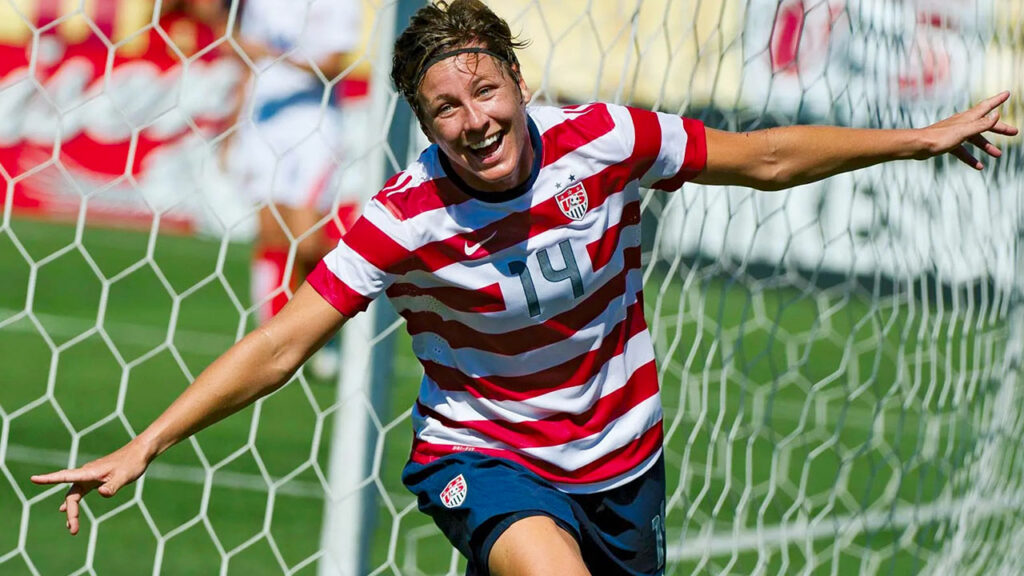
Wambach’s physicality and aerial ability made her a dominant force in the game. Her towering presence in the box and exceptional heading skills made her a constant threat to opposing defenses. Wambach’s ability to score crucial goals in big games earned her the reputation of a true clutch player.
Off the field, Wambach’s advocacy for gender equality and LGBTQ+ rights have further solidified her legacy. She has used her platform to champion causes close to her heart and inspire others to fight for equality. Wambach’s impact on women’s football extends far beyond her goal-scoring records, as she continues to be a role model for aspiring athletes around the world.
6. Renate Lingor (Midfielder, Germany)
With a remarkable career spanning over two decades, Renate Lingor left an indelible mark on the German national team and her club FFC Frankfurt. Known for her technical skills and free-kicks, Lingor’s contributions to the game have earned her a place among the all-time greats.
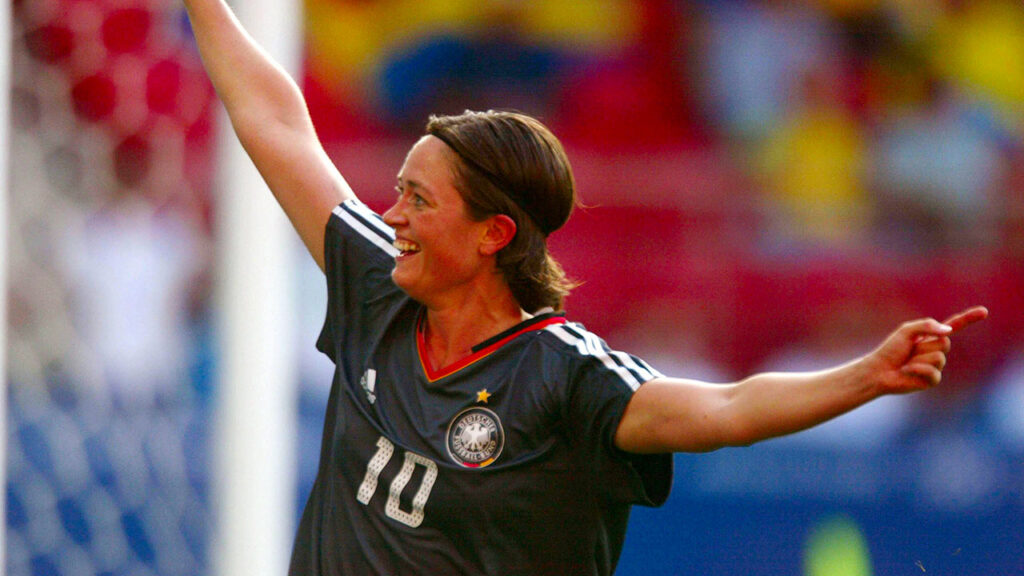
Lingor’s vision and passing ability made her a crucial playmaker for both club and country. Her ability to control the tempo of the game and create scoring opportunities for her teammates set her apart from her peers. Lingor’s free-kick expertise was also a weapon for her team, as she scored many important goals from set-pieces.
Throughout her career, Lingor’s resilience and dedication to the game were evident. She overcame injuries and setbacks, consistently delivering exceptional performances on the field. Lingor’s impact on women’s football in Germany cannot be overstated, as she inspired a generation of players and helped elevate the sport to new heights in her country.
7. Lily Parr (Forward, England)
A true trailblazer of women’s football, Lily Parr paved the way during a time when the sport was still finding its footing. Her powerful left foot and impressive goal-scoring record make her a legend who deserves recognition for her contributions to the game.
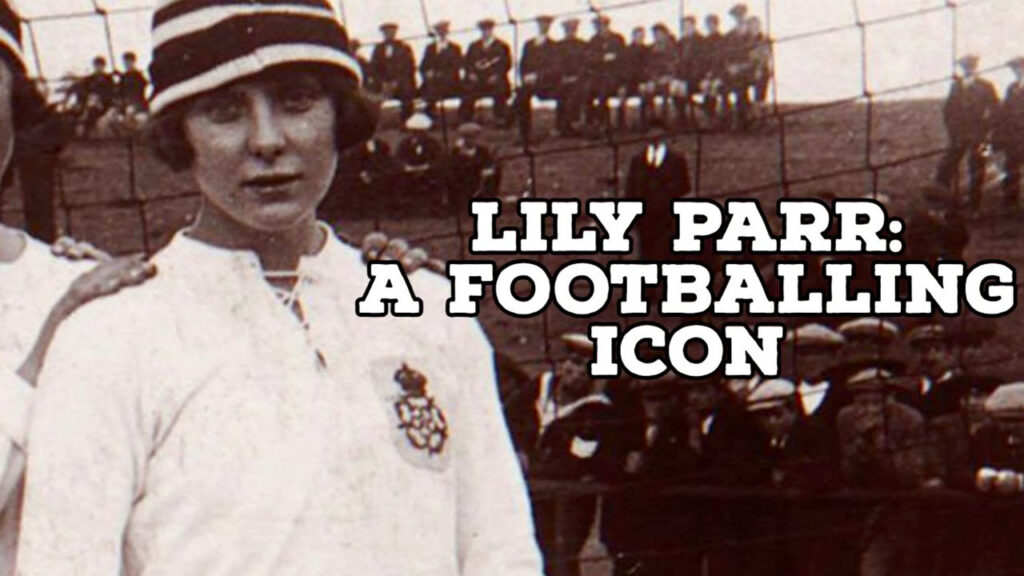
Parr’s left-footed strikes were a force to be reckoned with, as she could unleash powerful shots with great accuracy. Her goal-scoring prowess was unmatched during her era, and she regularly found the back of the net with ease. Parr’s physicality and technical abilities made her a standout player in a time when women’s football was often overshadowed and underappreciated.
Beyond her on-field accomplishments, Parr’s legacy lies in her role as a pioneer for women’s football. Her trailblazing efforts opened doors for future generations of female players, and her contributions to the sport will never be forgotten. Parr’s impact on women’s football in England and around the world is immeasurable, as she laid the foundation for the game’s growth and development.
8. Nadine Angerer (Goalkeeper, Germany)
Nadine Angerer’s goalkeeping brilliance earned her numerous accolades, including the FIFA World Player of the Year award in 2013. Known for her composed presence and impeccable saves, Angerer’s impact on the game cannot be overstated.
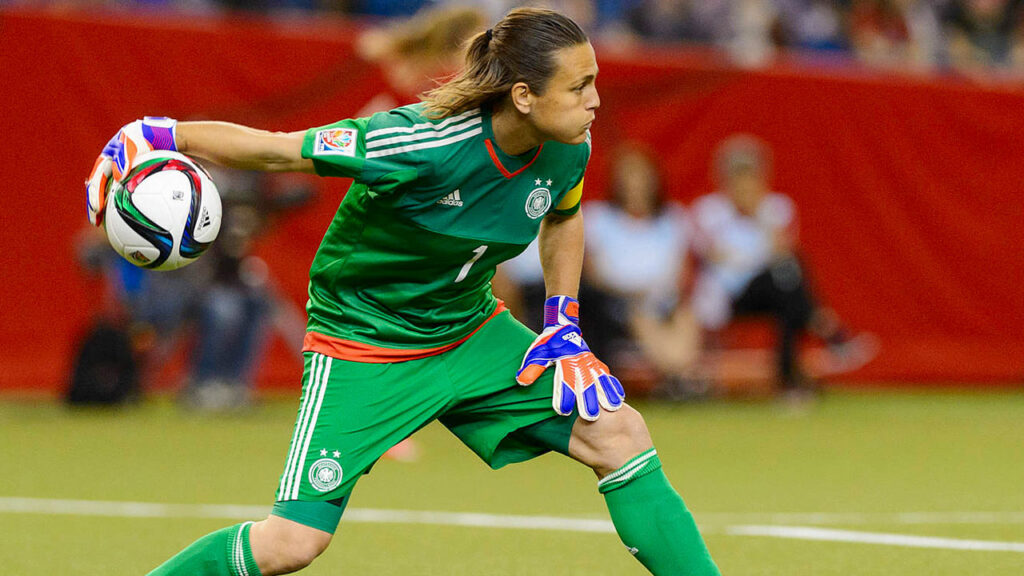
As a goalkeeper, Angerer’s reflexes and shot-stopping abilities were second to none. Her acrobatic saves and command of the penalty area made her a formidable opponent for any opposition. Angerer’s ability to stay calm under pressure and make crucial saves in critical moments earned her the admiration of fans and fellow players alike.
Off the field, Angerer’s leadership qualities and dedication to the game were evident. She led by example and inspired her teammates to give their best on and off the pitch. Angerer’s impact on women’s football in Germany and her contributions to the sport as a whole have solidified her status as one of the greatest goalkeepers of all time.
9. Carli Lloyd (Midfielder, USA)
Carli Lloyd’s unforgettable performance in the 2015 World Cup final solidified her place among the game’s legends. Her ability to rise to the occasion in crucial moments and deliver match-winning performances makes her a true game-changer.
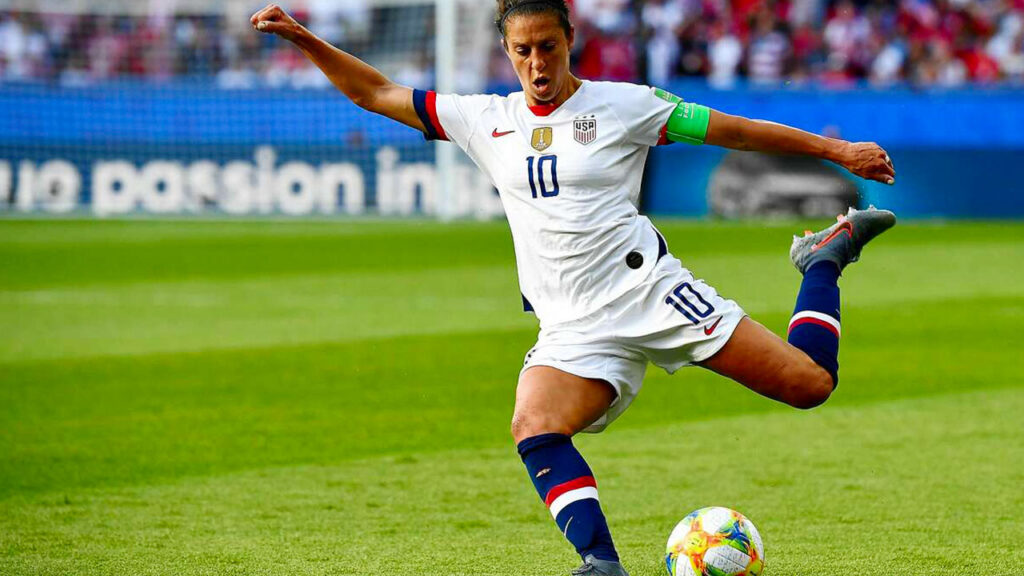
Lloyd’s determination and work ethic are evident in her performances on the field. Her tireless running, exceptional ball control, and powerful shots make her a force to be reckoned with in midfield. Lloyd’s ability to score from distance and her knack for scoring in big games have earned her a reputation as a clutch player.
Beyond her individual achievements, Lloyd’s leadership qualities and dedication to the team are commendable. She has consistently led by example and inspired her teammates to give their best. Lloyd’s impact on women’s football in the United States and her contributions to the sport’s growth and popularity cannot be overstated.
10. Birgit Prinz (Forward, Germany)
Birgit Prinz’s dominance on the pitch made her one of the most feared strikers in women’s football. Her impressive goal-scoring record and pivotal role in leading Germany to multiple championships make her an integral part of the sport’s history.

Prinz’s ability to find the back of the net with precision and ease set her apart from her peers. Her physicality, speed, and technical skills made her a constant threat to opposing defenses. Prinz’s ability to score in crucial moments, combined with her leadership qualities, made her an instrumental figure in Germany’s success on the international stage.
Off the field, Prinz’s professionalism and dedication to the game were evident. She consistently pushed herself to improve and set a high standard for her teammates. Prinz’s impact on women’s football in Germany and her contributions to the sport’s growth and development in her country cannot be understated.
Conclusion
These ten exceptional athletes have not only pushed boundaries but have also shattered stereotypes, leaving an enduring impact on the world of women’s football. Their skill, passion, and dedication have paved the way for future generations, ensuring that the legacy of female football’s greatest players continues to inspire and captivate audiences around the globe.
History of women’s football
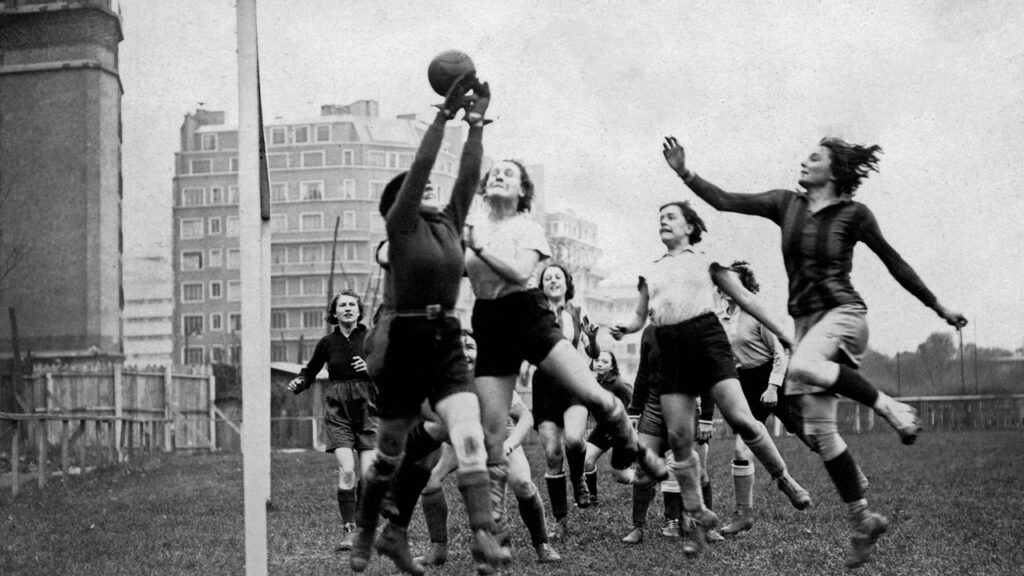
The history of women’s football (soccer) is a tale of determination, perseverance, and progress in the face of various challenges and obstacles. Here’s a brief overview of its evolution:
Late 19th Century – Early 20th Century:
Women’s involvement in football can be traced back to the late 19th century. The first recorded women’s football match took place in 1881 in Scotland, and gradually the sport gained popularity in various parts of the world.
However, in the early 20th century, women’s football faced resistance from authorities and societal norms. In 1921, the Football Association (FA) in England banned women’s teams from using football grounds affiliated with the FA.
Mid-20th Century:
During World War I and II, women’s football experienced a resurgence as many men were drafted into the military, leading to increased opportunities for women to participate in the sport.
In 1950, the English ban on women’s football was lifted, allowing the sport to regain some momentum.
1970s – 1980s:
The 1970s saw a renewed interest in women’s football, and the first Women’s World Cup was organized in 1970 by the Italian Women’s Football Federation.
In 1985, FIFA officially recognized women’s football by establishing the Women’s World Cup as a FIFA-sanctioned event.
1990s – 2000s:
The Women’s World Cup gained prominence, and women’s football began to gain recognition and acceptance worldwide.
The formation of various national leagues, such as the Women’s Premier League in England and the Women’s United Soccer Association (WUSA) in the United States, further contributed to the growth of women’s football.
2010s – Present:
The popularity of women’s football continued to rise, with more attention given to the Women’s World Cup and various club leagues.
The implementation of equal pay and better conditions for female players became an important issue, leading to increased advocacy and progress in this area.
Women’s football has also been more widely embraced at the grassroots level, with more opportunities for young girls to participate in the sport.
The history of women’s football has been marked by both achievements and challenges, including unequal treatment, lack of investment, and societal biases. However, the determination of female players, administrators, and supporters has led to significant advancements and a brighter future for the sport. Women’s football is now more recognized, respected, and valued than ever before, and its continued growth and success are testament to the dedication of those involved.


